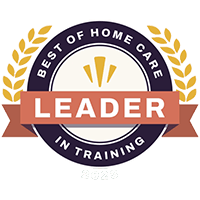Pneumonia is an infection in the lungs and is particularly devastating to elderly adults. As with many medical conditions, an early diagnosis provides the best possible outcome for treatment. When pneumonia is left untreated or they symptoms are ignored, it can lead to serious health issues in the elderly and even death. Family caregivers that are dedicated to providing elderly care and support to aging relatives need to learn about the symptoms of pneumonia in their loved ones so they can get medical attention quickly.
What is Pneumonia?
Pneumonia takes place when there is a respiratory infection and the air sacks in the lungs fill with fluid. The fluid reduces the amount of oxygen that can go from the lungs to the bloodstream. With reduced oxygen in the bloodstream, the body starts to divert precious resources to vital organs, which causes neglect for other areas. The infection can also introduce bacteria and viruses into the bloodstream and deliver these organisms elsewhere in the body.
Seniors are at a high risk of developing pneumonia due to age-related conditions and a weakened immune system. They are also more likely to be struggling with other health problems that can be further complicated by pneumonia. The bad news is that many family caregivers dont know the early symptoms of pneumonia in seniors and therefore dont recognize when their loved one needs help.
Recognizing Symptoms of Pneumonia in Seniors
When most family members think about pneumonia symptoms, they immediately imagine deep coughs that produce phlegm. However, elderly adults may only complain of a tightened chest or shortness of breath because they often cannot cough strongly anymore. Other typical early symptoms of pneumonia in the elderly include a fever, weakness, lethargy and increased heart rate. Elderly people with pneumonia often feel cold and shiver frequently. They may report a loss of appetite and may feel dizzy or confused. If they are not seen by a doctor or admitted to the hospital with these early symptoms, they could easily develop complications.
Because the actual symptoms vary from person to person, family caregivers should be safe and take their elderly loved one to the doctor if they notice anything out of the ordinary as it related to a lung infection. If they wait until the elderly persons body is full of infection, thats when complications arise and health problems are compounded.
Elderly care is all about looking after an aging relative that cannot do as much for themselves any more. Family caregivers have to be the ones to monitor their overall health and wellness. This includes getting an early diagnosis for seniors with pneumonia so they can overcome the disease.
Source:
https://www.mayoclinic.org/diseases-conditions/pneumonia/symptoms-causes/syc-20354204
If you or an aging loved one are considering elderly care in Minnetonka, MN, and the surrounding areas, please contact the friendly staff at CareBuilders at Home Minnesota. Call today 612-260-2273.








